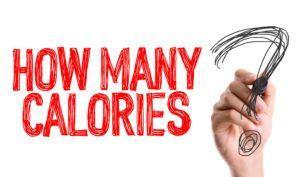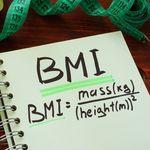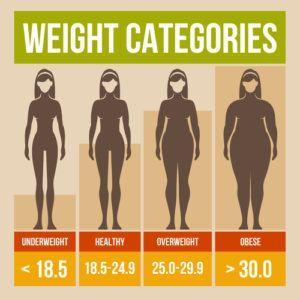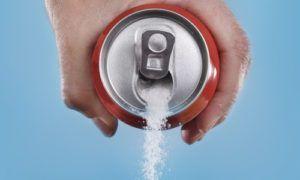
Figuring out how many calories you need to consume to lose weight shouldn’t be a frustrating task.
We’ll show you how to determine exactly how many calories you need to eat to lose weight. No guessing is required.
Average Calories
On average, an adult woman needs to eat around 2000 calories per day to maintain her weight, and 1500 calories to lose one pound.
An adult man needs around 2500 calories per day to maintain his weight, and should consume around 2000 calories to lose a single pound. We’ll explain why in a moment.
These round numbers don’t take into account a person’s physical activity levels, their height, bone structure, or other factors, though, so while the 2000 and 1500 calorie suggested diets are a good rule of thumb, they don’t really translate well into weight loss, because they don’t give an accurate picture of your body composition.
BMI – Body Mass Index

This is where BMI comes in. Your Body Mass Index, or BMI takes into account your height and weight to give you a more accurate picture of the number of calories you should be consuming daily to lose weight. It is based on the following calculation;
- Divide your weight in kilograms (kg) by your height in meters (m),
- Then divide that answer by your height again to get your BMI
You can also use a BMI calculator at the gym, a doctor’s office or one of many that are available online, for instance, this calculator which offers a calculation based on feet and pounds offered by the National Institute of Health.
These are also standard BMI calculators, which don’t account for activity level, sex, or other factors, such as if a woman is pregnant or breastfeeding.
You can even download a BMI calculator app (available for iPhone and Android ).
A normal BMI exists within a range. For example:
If you enter your weight and height into a calculator, or if you figure out the math yourself, by hand, you are considered:

- Underweight if your BMI is less than 18.5
- Normal weight if your BMI is between 18.5–24.9
- Overweight if your BMI is between 25–29.9
- Obese if you a BMI of 30 or greater
These ratios offer a sliding scale for weight, but they don’t take into account the fact that someone who is obese might weigh the same as another person of the same height and weight who happens to be a super-fit weight lifter.
So, just as with general rules about the number of calories you should consume, a BMI calculator will only work if you fall within the ‘average’ scale of fitness.
You should feel encouraged to move beyond ‘average’ once you start losing weight, and move toward outstanding. As you get leaner and fitter you’ll certainly be inspired to achieve ever more amazing fitness goals.
Creating a Caloric Deficit
Essentially, to lose weight you need to create a caloric deficit. This needs to be done slowly, though, and not too drastically, or the body will be tricked into thinking it is starving, and instead of losing weight, you will end up in a yo-yo cycle of dieting (calorie restriction) followed by binging (because your body feels deprived) resulting in weight GAIN instead of weight LOSS.
Just remember that your ideal body weight should take into consideration:
- Your age
- Your sex
- Your bone structure
- Your fitness level
Your ideal body weight using a HAMWI calculator will give you a range of what you should aim for in weight loss.
These calculations are based on the following:
- M = 106 lb for the first 5 ft + 6 lb for each additional inch.
- M = 48 kg for the first 152.4 cm + 1.1 kg for each additional cm.
- F = 100 lb for the first 5 ft + 5 lb for each additional inch.
- F = 45 kg for the first 152.4 cm + 0.9 kg for each additional cm.
Here are two simple examples:
Let’s say you are a 5’6” woman who weighs 150 pounds. Your ideal body weight is around 130. This means you need to lose 20 pounds to reach your ideal body weight.
If you were a 6’6” tall man who weighed 260 pounds, and your ideal weight is 214 pounds, you would need to lose 46 pounds to reach that goal.
In takes about 3500 calories to burn one pound
This is why it is generally advised to lower a 2000-calorie diet to 1500 calories (resulting in a 3500-calorie deficit per week).
If you were able to cut 500 calories from your diet every day, either through exercise, changing your diet, or boosting your resting metabolism, you would start to see pounds melt off at the rate of one per week.
5 Ways to Help Reduce Your Calories by 500 Every Day

There are many ways to help lower your daily caloric intake:
- One of the fastest ways to reduce calories is to give up sugar. A single teaspoon of sugar, for example, contains 16 calories. A single can of soda can contain up to 39 grams of sugar, which amounts to around 140 calories for a SINGLE BEVERAGE! If you drink 3 sodas a day, you could reduce your total calories by 420 calories. This also goes for sugary snacks.
- Don’t eat in front of the television. When we sit down with a bag of chips or other snacks while watching TV, we almost always eat more calories than we really need. According to research from the University of Massachusetts, you’ll eat an additional 288 calories in one sitting.
- Eat a whole piece of fruit instead of drinking fruit juice. Whole fruit contains pectin and fibre, which most juice lack. Fruit juice is also made with added sugar, too. Even when it isn’t a typical glass of orange juice will contain 150 calories, while a single orange will contain only 45 calories.
- Skip the Alcohol. Alcoholic beverages are the worst when it comes to adding unwanted extra calories to your diet. A single 12-ounce glass of beer contains 150 calories.
- Choose Greek Yogurt Instead of Mayo. Not only does non-fat Greek yogurt have fewer calories than mayo, but with extra protein and less sodium, it’s a great calorie-lowering substitution.
It is not advisable to lose weight much faster than this, because if you reduce your calories too fast, and too much, your body might think its starving – there’s one caveat to this, though.
If you lose weight simply by eating clean and doing moderate exercise, you have nothing to worry about.
If you lose weight by drastically cutting calories and then over-eating to supplement, then you are throwing your hormonals system into chaos. Ghrelin, leptin, and other hormones created by your body to tell you that you are full, and to stop eating, will stop working correctly.
Not All Calories Are Created Equally
If you focus on eating clean and moving more, you’ll arrive at your ideal body weight in the most healthy way. That’s because not all calories are created equally.
The human body is a very complex biochemical system with elaborate processes that regulate energy balance. Different foods go through different biochemical pathways, some of which are inefficient and cause energy (calories) to be lost as heat.
Some calories we eat cause us to burn more fat, and some calories cause us to store more fat.
For example:
- Glucose and fructose, two forms of sugar have an identical chemical makeup. The way they are treated by the body is very different though. Glucose can be metabolized (burned up) by the body’s tissues, whereas, fructose can only be processed by the liver. If we eat a lot of fructose (as in high fructose corn sugar in so many convenience foods) we will eat more! That’s because fructose causes an increase in ghrelin, a hormone our body releases to tell us we are hungry.
- There are different metabolic pathways for different types of foods we eat, like carbs, fats, and proteins. Something called the thermic effect determines how much different foods increase energy expenditure, due to the energy required to digest, absorb and metabolize the nutrients contained in them. In short, protein burns slowest, carbs a little faster, and fats the fastest of all. It requires a lot more energy for your body to process 100 calories of protein than it does 100 calories of carbs. To increase our ‘thermic effect’ we want to aim for a 55-65% protein content in every meal we eat. We’ll stay fuller longer, and our bodies will burn more calories trying to metabolize the protein compared to fats and carbs.
- When we don’t get enough nutrients from the foods we eat – no matter how many calories we consume, we will want to eat more. By trying to eat nutritionally dense foods, and giving up foods that have only fats and sugars, but not vitamins, minerals, or other nutrients, we can more easily arrive at our ideal weight.
Success Tips

To determine how many calories you should eat to lose weight, first determine your ideal body weight, and your body mass index (BMI). Then determine the total number of calories you need to lose to reach your ideal weight.
If you needed to lose 30 pounds, realize that if you lose one pound per week, it will take you approximately 7-8 months to lose the weight in a healthy, no-stress way.
This will take some pressure off of you as you determine your weight loss priorities, and set a more realistic goal which you can easily reach with clean eating and adding some moderate exercise.
Try to remove the bad stuff and add good wherever you can – for instance removing sugary sodas, and adding more water.
Instead of watching television while you snack on junk food, go for a walk. For every negative habit you take away, try to replace it with a better habit.
Stay positive. Your attitude means everything when trying to lose weight. If you have a slip one day, and consume more calories than you should have, don’t try to cut back excessively the next day, just start again with a clean slate, and resolve to make better food and lifestyle choices in the future.
Weight loss is easier, when a happy heart accompanies the journey.

